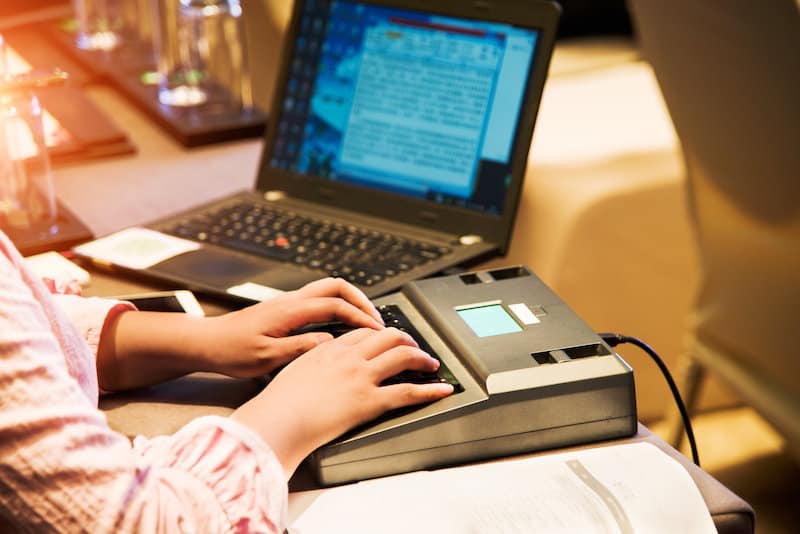
30 Oct How Fast Do You Have To Type To Become a Court Reporter?
How Fast Do Court Reporters Have to Type?
When looking for a new career, you often question if you have the right skills to perform the job, in this case, a court reporter. After some thorough research, I have found that there are several skills required to become a court reporter. The most important is the number of words per minute that you can type. In addition, steps can be taken to enhance your typing speed if you desire to become a court reporter. Court reporters are responsible for recording every word spoken in a courtroom and play an integral role in the justice system.
So, how fast do you have to type to become a court reporter? On average, most people can type roughly 40-60 words per minute. However, the legal profession of court reporters in the United States are required to have the skill to type an average of 200-225 words per minute. Some can reach 300 words per minute or higher. Therefore, each reporter will have to be able to type at least two-thirds faster than the average person. This takes years of practice and training.
Court reporters meet this speed for taking down notes during trials or depositions. Keep reading to learn more about the profession of court reporters and why they need to type so quickly. We will also take a look at what other skills are necessary for this role.
What Is a Court Reporter?
 Court reporters are the only people who can record what is stated during legal proceedings. They must have excellent typing skills and be able to work under pressure.
Court reporters are the only people who can record what is stated during legal proceedings. They must have excellent typing skills and be able to work under pressure.
The reporters provide an official written transcript of everything that is communicated and done in the courtroom. This helps judges make decisions about cases.
Court reporters also transcribe other types of meetings and hearings, such as depositions and arbitrations. The standard for these reporters is to type fast enough so that nothing gets missed.
However, they must still be able to accurately transcribe what is said on the spot without any errors or omissions. They are also required by law to produce transcripts of what was communicated in these proceedings within 24 hours of the trial’s conclusion.
Why is Typing Speed Important?
Let’s take a look at why typing speed is important for court reporters. If the transcription rate is around 200 wpm rate, that means if someone speaks at 100 wpm, they will speak for 1 minute and 40 seconds before their statement has been transcribed on paper or into digital form.
It may not seem like much time, but that adds up quickly for an entire day or week of work! Speedy typing makes all the difference when it comes to getting through the transcriptions efficiently and accurately.
Skills Needed For Court Reporters
You must know the skills needed to be successful in this career. Court reporting is a career that requires many different skills and abilities. If you want to perform well in this profession, it takes more than knowing how to type fast.
You need to know how to write well and have good grammar skills as well. Court reporters have an important job that requires dedication, accuracy, and high typing speed.
As a court reporter you will need the following skills:
- Excellent writing and typing skills (Average of 200-225 words per minute).
- Strong listening comprehension and memory recall abilities so that you can hear what is being said clearly and accurately. This skill includes hearing all voices equally well, even when background noise or multiple people is speaking simultaneously.
- Great attention to detail since every word spoken by witnesses, attorneys, and defendants must be recorded accurately for later use during legal proceedings.
- Strong language comprehension abilities so that you can understand legal jargon and technical terms quickly and easily without having to ask for clarification from the judge or attorneys on the case.
- Ability to produce accurate transcripts of everything said during trials or depositions. This means they must be able to type quickly while still maintaining accuracy.
- Excellent attention span because court reporting requires long periods of focus with little time for breaks between proceedings or recesses during trial proceedings.
- Desire to obtain state certification requirements when required.
Tips to Become a Fast Typist
 Now that we know why speed matters, here are some tips on how you can become better at typing fast! First of all, the more time you spend practicing typing, the faster your fingers will move across the keyboard.
Now that we know why speed matters, here are some tips on how you can become better at typing fast! First of all, the more time you spend practicing typing, the faster your fingers will move across the keyboard.
Secondly, try out different keyboards until one feels suitable for your hands and fingers. This will help prevent any strain or pain while typing, which could slow down your speed over time.
Lastly, do not forget to take breaks! Your body needs rest just like anything else does. If not taken care of properly it will not function as well as it should. Taking short breaks throughout the day might seem counterproductive.
However, they are highly beneficial. They give your mind a chance to relax and recharge before jumping back into typing mode again.
Typing fast is important for any profession, especially if you are a court reporter. If you can type faster than the person speaking, it will be easier for your audience to understand what they are saying and take notes.
It also helps with accuracy so that your transcriptions are perfect every time. There are many different techniques and methods out there for learning how to type faster. However, not all of them work. Some people try using their two index fingers or use all ten fingers at once. Both of these methods do not work because they slow down your speed instead of increasing it!
How to Become a Court Reporter
If you have dreams of becoming a court reporter you may be asking, what if I do not have these skills listed above?
The good news is that there are plenty of online resources available that can help aspiring court reporters improve their typing skills so they can meet the minimum requirement for employment in this field.
These include free practice tests and paid courses designed specifically for those who want to learn how to become a stenographer or real-time reporter.
You should also consider joining a local chapter of the National Court Reporters Association if your state allows it. Members of the association receive discounts on certification exams and other related expenses.
Finally, make sure you have access to high-quality equipment like steno machines and computer software before starting your training program so you do not waste time learning with subpar tools when it comes time to take the actual test!
You have to learn how to use special stenography machines. These allow you not only to type faster than ever before but also to record everything being said during trials or other legal proceedings.
Improving Your Typing Skills to Become a Court Reporter
 There are a few ways to meet the goal of 200 words per minute. Many online courses include lessons on everything from basic keyboarding techniques and advanced transcription methods like real-time reporting, voice writing, and stenotype.
There are a few ways to meet the goal of 200 words per minute. Many online courses include lessons on everything from basic keyboarding techniques and advanced transcription methods like real-time reporting, voice writing, and stenotype.
You could start by taking an online typing class. This will teach you everything from basic touch-typing skills up to advanced stenotype techniques.
You will be able to practice your new skills with typing games and quizzes until they feel completely natural.
Another step to obtain these typing skills and court reporter skills would be to see if your state has any required certification that is accredited to become a court reporter. You can do this by contacting the National Court Reporters Association (NCRA).
NCRA Certification Course
If your state requires this certification, you will have to complete the courses and reporter exam before becoming a court reporter. The courses required by the NCRA Certification typically last between 18 months and three years depending on whether or not students choose to pursue certification after graduation.
Students will learn everything from basic transcription techniques like keyboarding speed drills and shorthand writing exercises to advanced stenography skills such as real-time reporting with voice recognition software.
The curriculum also includes coursework related to legal terminology, medical transcription procedures, business practices for professional transcriptionists, computer applications for transcribing professionals including using speech-to-text software, proofreading techniques for accuracy purposes, and foreign language interpretation studies if applicable.
After completing a degree program students may sit for the NCRA national certification exam, which is offered twice per year at testing centers throughout North America. Once they pass this test they will have earned their Certified Realtime Reporter (CRR) designation which is recognized by state licensing boards.
In Conclusion
If you are interested in becoming a court reporter, you must know what specific skills are required for this job. You will need an excellent command of your language in addition to typing skills that allow you to keep up with people who speak quickly.
It may take several years before you can even think about reaching those speeds! But once you get there, it will feel like an accomplishment worth celebrating! It is an incredibly rewarding career path if you love writing and are passionate about law and justice.





